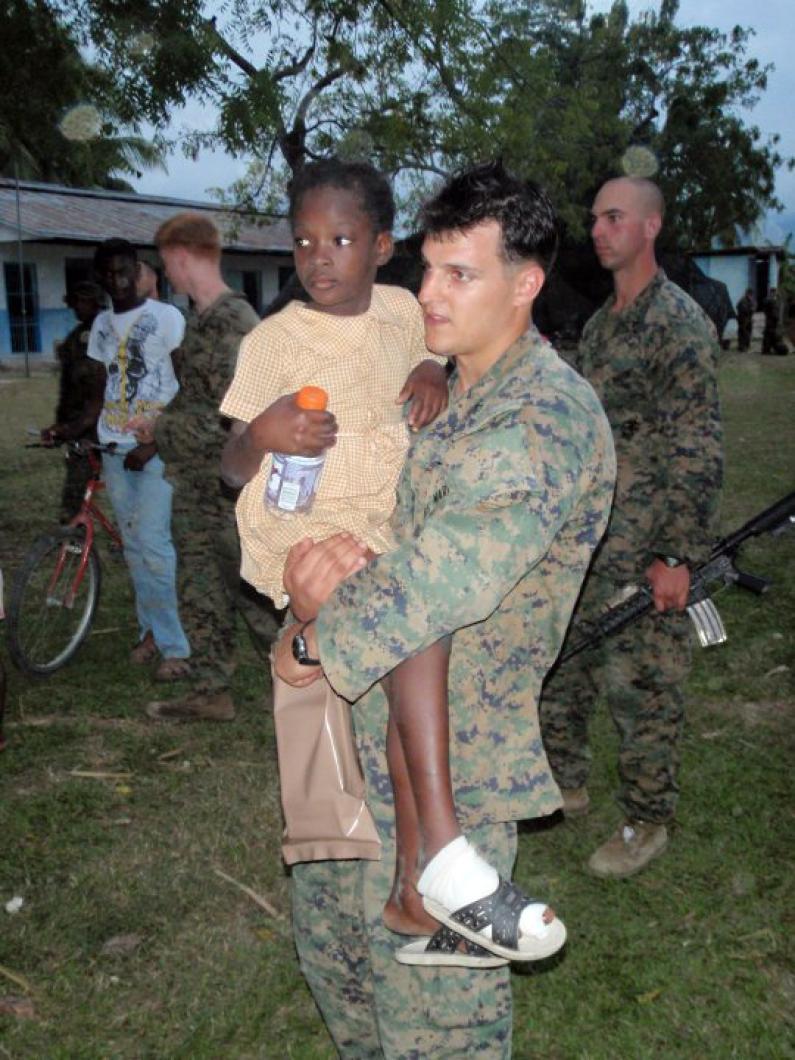Four months ago 22-year-old Anthony Sullo, a Lance Corporal in the U.S. Marine Corps, had just returned to the Vineyard after a four-year tour of duty, during which he served as an infantryman and team leader in several different countries, including Afghanistan and Iraq, in support of Operation Enduring Freedom.
For the most part, Mr. Sullo, who graduated from the Martha’s Vineyard Regional High School in 2006 and joined the Marines soon after, was done with active military service. He still had to return to his home base in Camp Lejeune, N.C., at some point for a brief spell, but after that his tour of duty was up.
He was home for two weeks around the Christmas holidays, and was at the gym one night and was watching television when the first news reports surfaced of the powerful earthquake that struck the island nation of Haiti on Jan. 12. The earthquake would kill an estimated 230,000 people, injure some 300,000 more and leave nearly one million Haitian residents homeless.
Right away, the young lance corporal recognized this was the type of natural disaster that his division, the 22nd Marine Expeditionary Unit, might respond to. The 22nd is a multimission force that includes a Marine heavy helicopter Squadron 461, a combat logistics battalion and a battalion landing team.
In short, a unit trained to handle just about anything.
The next day President Obama promised rescue and humanitarian efforts, and soon Mr. Sullo and the rest of the members of the 22nd MEU got the call — they were heading to Haiti. He had been home for about two weeks, operating under the idea that his active service was almost over, but here he was off again, this time not to the Middle East but an entirely new corner of the world.
“When I got the call I thought — this is unreal. I just got home. But I accepted it pretty quickly . . . you sort of have to,” he said.
Within 48 hours, the elite unit had mobilized and was sailing out of Morehead City Port, N.C., on the U.S.S. Bataan en route to the earthquake-stricken country. As part of the Bataan Amphibious Ready Group, Mr. Sullo and the 22nd were the first members of the U.S. military to arrive in the devastated island nation.
The trip over lasted two days, during which Mr. Sullo’s commanders told them what to expect.
“They said it might be pretty bad. We were given riot gear and shields just in case because the people were desperate . . . they thought it could get violent,” he said.
When the Marines arrived days later, Mr. Sullo said the situation was worse than they imagined. His unit was sent into the area around the epicenter of the quake near the town of Léogâne, as well as the nation’s capital of Port-au-Prince, where the damage to infrastructure and the death toll were greatest.
“The buildings were collapsed, the place was in ruins — everything was in ruins. It looked like a war zone,” he said. “We saw a lot of kids, between the ages of five and 15, running around without their parents. We knew their parents were gone, buried [in the ruins] probably, it was sad.”
But if there was a small measure of comfort, which Mr. Sullo admits was hard to find, it was the greeting the Marines received from the suffering Haitians. Although there was some looting and bad behavior, he said most of the people were friendly and happy to see them.
“The people wanted us there. When we first got there, I think some people thought we were invading their country. It sounds strange, but I think they wanted us to invade them. Mainly what they wanted was our help . . . the food and supplies. The whole time there we never saw any [Haitian] police, it was just us,” he said.
Mr. Sullo’s primary job was to open food distribution points and help coordinate aid to the thousands of people who needed medical help. A typical day started around 4 a.m. when his unit would assist a number of missionary doctors; they would later do patrols around town and set up food distribution points three times a day.
“There were always people in need of food, it never ended. I don’t even know how much rice we gave out — but it was a lot. It seemed everyone needed help,” he said.
He said it was apparent that corruption was rampant in Haiti, although when he was there all the supplies and humanitarian aid seemed to reach the proper people. Generally speaking the people responded more favorably to the Marines than to some other groups. “They didn’t like the [United Nation] peacekeepers as much. I really can’t say why, they just didn’t trust those people.”
Mr. Sullo said there were similarities to his service in countries like Iraq, but also differences. “I think we were helping people in both situations, but the difference [in Haiti] is they were happy to see us,” he said.
And of course there are bigger differences to being back home on the Island. When he stepped off the ferry in Vineyard Haven last Sunday night, he received a warm welcome from friends and family members. He is planning to work this summer at Rocco’s Italian Restaurant in the Tisbury Marketplace, which is owned by his father, Peter, and cousin Christopher Pantalone. After this summer he plans to explore some type of career in the medical field.
But for the time being he is still getting used to a return to Island living.
“I figure I’ll get used to it, but it’s still weird waking up at 9 a.m. every morning. But it’s definitely good to be back,” he said.




Comments (1)
Comments
Comment policy »